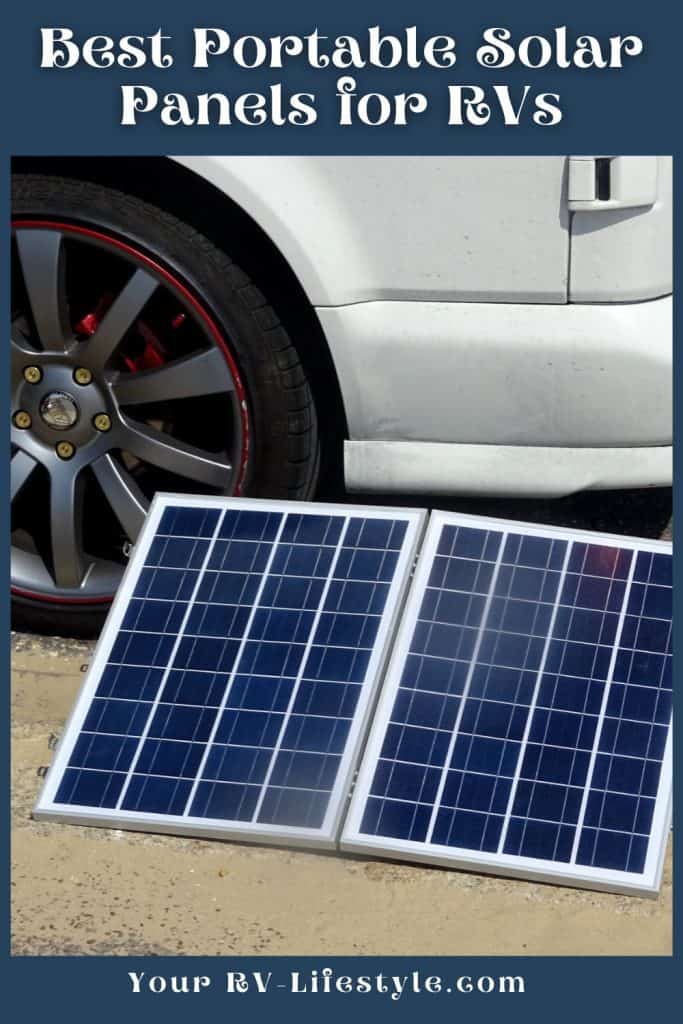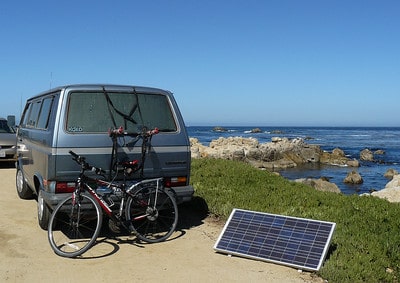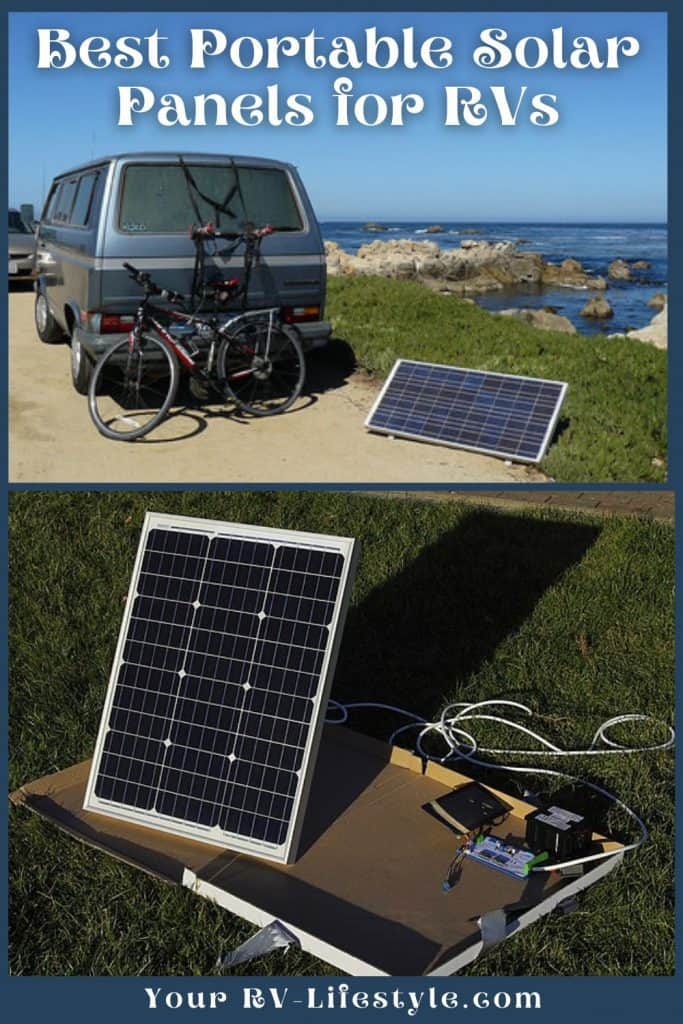Heading out into the backcountry for some boondocking or off-grid camping can be a wonderful way to escape from the hustle and bustle of the big city. You may head into the middle of nowhere, but this doesn’t mean you have to forgo all your comforts like hot water and light!
Having electricity is a nice luxury to have and the easiest, most environmentally friendly way to do this is with portable solar panels for RVs. If you plan on camping with a few people and have a large RV, you can install a massive solar array with multiple solar panels on the roof of your rig.
If you plan on camping alone and only need a minimal amount of energy for the basics such as light and recharging devices, then smaller portable solar panels are your best bet.
Portable solar panels for RVs are a great way of providing environmentally friendly energy for light and recharging devices.
What is a Portable RV Solar Panel?
A portable RV solar panel is a lightweight silicon panel attached to a charge controller that stores and generates electricity. Like the solar panels that are installed on the roofs of houses or large RVs, these smaller portable solar panels are movable and can be placed anywhere around the campsite.
Portable RV solar panels usually have MC4 connectors which allow them to be very easily connected to a charge controller. This charge controller is then connected to the RV’s 12V battery bank or house battery to maintain a constant charge.
Portable RV solar panels usually have MC4 connectors which allow them to be very easily connected to a charge controller. Raspberry PI & Solarmodul als gesamter Aufbau by MAmberg / WikiCommons / CC BY-SA 4.0.
Types of Portable Solar Panels for RVs: Polycrystalline vs. Monocrystalline Solar Panels
There are three types of portable solar panels for RVs: Monocrystalline, polycrystalline, and amorphous panels.
Monocrystalline
Constructed from a single large silicon crystal, monocrystalline panels are generally dark blue or black in color and are small making them super-space efficient. They are also very efficient at generating energy/power and least sensitive to high temperatures, however, are more expensive than polycrystalline panels.
Polycrystalline
These panels are created from multiple blocks of silicon and tend to be more affordable than monocrystalline panels as they are less costly to produce. Lighter blue in color, these types of panels, however, are slightly less efficient than monocrystalline solar panels, producing less power and taking up more space.
Amorphous
These panels are created by spreading silicon on a large bed. Also known as thin-film panels, these types of panels are budget-friendly, flexible, and allow for more installation options. The downside to amorphous panels is that they are larger than monocrystalline and polycrystalline panels and need more space to store and set up.
What are the Advantages and Disadvantages of Portable Solar Panels for RVs?
There are several advantages and disadvantages to using portable solar panels for RVs.
| ADVANTAGES | DISADVANTAGES |
| No installation is required – they simply need to be placed in the sun and connected. | Expensive |
| Portability – the panels can be easily moved to follow the sun. | Large solar panels can be heavy |
| Direct charge – some portable solar panels for RVs have built-in USB ports that allow you to charge devices directly from the panel itself | Require set-up and break-down at each campsite |
| Can easily be connected to a solar generator small inverter for a compact power station | Need to be stored when not in use |
| Can charge several appliances and devices – laptop computers, small gaming devices, lights, a television, a CPAP machine, and/or a small 12V refrigerator | Possibility of theft |
A portable RV solar panel is a lightweight silicon panel attached to a charge controller that stores and generates electricity. Portable Solar Panel with Volkswagen Camper by docentjoyce / Flickr / CC BY 2.0.
Best Portable Solar Panels for RVs
We hit the road in our RV to try and test some of the best solar panels for RVs and here’s what we came up with.
Best Overall: Zamp Solar Legacy Series 140-Watt Portable Solar Panel Kit
Handcrafted in the USA, Zamp is a well-known brand that manufactures solar panels designed to last a lifetime. Although slightly more expensive than other brands, Zamp solar panels come with a 25-year output warranty and have integrated charge controllers that protect both the battery and the panel.
The Zamp Solar Legacy Series 140-Watt Portable Solar Panel Kit can use acid or lithium batteries and the integrated charge controller helps the batteries to last up to three times longer. The solar panel kits come with a 140-watt foldable panel, a 10-amp charge controller, a 15-foot cable, and a nylon carrying case to store the solar panels neatly away when not in use.
Pros
- No installation required
- Integrated charge controller protects the battery and panel
- Kits come in different wattages
- C-Slim, easy-to-store case
- 25-year output warranty
Cons
- Only one lighting and beam setting
- Not a standalone product
No products found.
Best for Adaptability and Flexibility: Renogy 100-Watt Eclipse Monocrystalline 20A Voyager Solar Suitcase with Waterproof Controller
Combining cutting-edge technology and engineering precision, the Renogy 100-Watt Eclipse Monocrystalline 20A Voyager Solar Suitcase with Waterproof Controller has a 248-degree arc flexible range thanks to state-of-the-art lamination techniques and innovative solar cell technology.
Constructed from advanced polymer materials, the German-made Renogy 100-Watt Eclipse Monocrystalline 20A Voyager Solar Suitcase solar cells are housed in a protective casing mounted on an adjustable corrosion-resistant aluminum stand.
These solar panels are also 95% thinner, making them extremely lightweight, but still able to withstand extreme winds of up to 2400 PA and snow loads of up to 5400 PA. They also weigh 70% less than conventional solar panels, making them super easy to install, move, and transport.
The Renogy 100-Watt Eclipse Monocrystalline 20A Voyager Solar Suitcase kit includes a 20-amp 5-stage waterproof solar charge controller with an LCD display and adjustable settings. The cables include MC4 connectors for each connection to solar generators and some electrical systems, as well as alligator clips for the direct connection of the solar controller to a 12V battery.
Pros
- Super flexible: 248-degree arc
- Housed in a protective casing
- Lightweight and adaptable
- LCD display and adjustable settings
- Includes MC4 connectors
- 25-year power output warranty
No products found.
Best for Long Trips: Eco-Worthy Off Grid Solar Panels
Specifically designed for extended outdoor use, the 195-watt monocrystalline Eco-Worthy Off Grid Solar Panels feature a corrosion-resistant aluminum frame and weigh approximately 30 pounds each.
Producing 1,000-watt-hours per day, the Eco-Worthy Off-Grid Solar Panel can charge a 50Ah battery from 50% to 100% in only 90 minutes in bright sunlight. Other features include anti-reflective, high transparency, low iron tempered glass with enhanced stiffness and impact resistance, and pre-drilled holes on the rear help to make the mounting and securing process simple and easy.
Pros
- Ideal for extended outdoor use
- Corrosion-resistant aluminum frame
- 1,000-watt-hours of power per day
- Anti-reflective, high transparency, low iron-tempered glass
- Pre-drilled holes for easy installation
No products found.
Best for Portability: Hiluckey Outdoor Portable Solar Charger
When it comes to camping, the best portable solar charger for RVs on the market is the Hiluckey Outdoor Portable Solar Charger. Weighing just 1.3 pounds and built with rugged construction that is dust, shock, and waterproof, this convenient little portable device can easily be attached to your backpack or set on the dashboard of your RV.
Four foldable high-efficiency solar panels on the charger boast one amp of current in the sunlight and it can be charged with a USB cable via dual USB outputs. It has a built-in 25,000mAh Li-polymer battery for charging devices multiple times.
A built-in LED flashlight with three modes (normal, strobe, and SOS) mode is a great addition for night walking, cooking, or outdoor emergencies when light is needed. The Hiluckey Outdoor Portable Solar Charger also automatically and intelligently detects the current of the dual output port to provide optimal charging output, thus protecting the device from overheating, overcurrent, overvoltage, or short-circuiting.
Pros
- Lightweight and convenient
- 25,000mAh Li-polymer battery
- Built-in flashlight with three modes
- Automatic detection of the current of the dual output port
No products found.
Notable: Goal Zero Boulder Solar Panel Briefcase
The Goal Zero Boulder Solar Panel Briefcase is a 100-watt monocrystalline solar panel that is super lightweight and very adaptable. Constructed with tempered glass and rigid, anodized aluminum the Goal Zero Boulder Solar Panel Briefcase weighs about 26 pounds and features an adjustable kickstand to help with portability.
Built to last and survive, the Goal Zero Boulder Solar Panel Briefcase has added corner protection and a built-in kickstand for positioning the panels for optimal solar collection. It also comes with a carrying case for optimal storage and protection and a two-year warranty.
Pros
- Lightweight and portable
- Anodized aluminum frame with corner protection
- Carrying case for transport and storage
- Two-year warranty
Cons
- Expensive
No products found.
ACOPOWER Portable Solar Panel Kit
The ACOPOWER Portable Solar Panel Kit is a lightweight, convenient, and very adaptable portable solar panel kit that can be used for outdoor activities and backcountry camping. The 120-watt panel is made of three 40-watt flexible monocrystalline solar panels that fold down to become almost flat, which is great for transporting and storing.
The controller has two USB ports, allowing for the charging of devices like phones, lights, tablets, and speakers, as well as a flexible charger and a kickstand, to tilt the panels toward the sun for higher efficiency charging.
Pros
- Easy installation and set-up
- Two USB ports for charging devices
- Flexible charger
- Kickstand for higher efficiency charging
Cons
- Not waterproof
No products found.
Frequently Asked Questions
Who are portable solar panels best for?
Portable solar panels are best used by campers who are planning on going off-grid or boondocking where they will need access to power. They are best for weekenders or basic campers that only need to charge something for a short amount of time.
What size portable solar panel do I need to charge my RV battery?
This will depend entirely on how much power you use and the size of your battery bank. You will also need to take into consideration the variable of the sun itself and its unpredictability – remember the strength of the sun will determine the time it takes to recharge a battery. Other factors such as ambient temperature, the time of day, the location you are in, and the amount of cloud cover play a role in the amount of solar power your panels will produce.
However, there’s a rule of thumb that experts use which says that in general, a 100-watt solar panel will generate around 30 amp-hours per day. Therefore, on average, your 100-watt solar panel will put around 30 amp-hours per day back into your battery bank.
How fast can a 100-watt solar panel recharge a battery bank?
Again, this will depend on several variables including the nature of your electrical system/battery bank, the devices you’re running, how long you run them, how much sun the panels get, as well as several other variables.
If you have a 100-watt portable solar panel, your battery bank will likely be charged sufficiently to power small, low-power-draw devices such as your cell phones, RV lights, vent fan, tablets, small battery packs, and even your water pump – for variable amounts of time.
What will a 200-watt solar panel run?
A 200-watt solar panel will charge your battery bank sufficiently to run small, low-power-draw devices such as your cell phones, RV lights, vent fan, tablets, and small battery packs, as well as small appliances such as a coffee maker and a hairdryer if you have an inverter (though not for extended periods).
Happy Camping!


Jill Miller is the founder of Your RV Lifestyle. Trading corporate America for the open road, Jill, along with her partner Jose, began their RV journey, making an unconventional start by wintering in New Jersey. A natural adventurer, she was motivated by a desire to explore the USA and beyond, embracing the varied landscapes, communities, and cultures across the country.
For Jill, the allure of RV living was not about material accumulation, but rather the pursuit of an adventurous, fulfilling lifestyle. A lover of golf, bicycling, hiking, and line dancing, she has carried her passions across the country, engaging with them in diverse settings. Jill’s commitment to the RV lifestyle came after years of careful research, numerous consultations with RV owners, and personal trials, including living in a rental RV.



